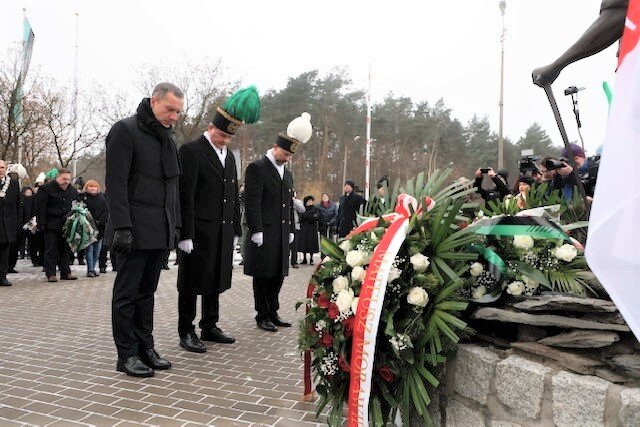Remembrance of Heroes - celebrations of the 40th and 41st Anniversaries of the Pacification of the Rudna Mining Facility
Memories, emotions, remembrance - KGHM commemorated the 40th and 41st anniversaries of the Pacification of the Rudna Mining Facility. The miners, heroes of the events of December 17, 1981, received state decorations and awards from the company. Last year’s celebration of the round anniversary of the events was canceled due to the pandemic.
The main ceremony was held at the Guild Hall of the Rudna Mining Facility, where the miners’ protest action began 41 years ago. During the celebration, letters from Speaker of the Sejm Elżbieta Witek, Poland’s Prime Minister Mateusz Morawiecki, and leader of the Law and Justice Party Jarosław Kaczyński were read out.
“The Copper Miners have gone down in Polish history due to their patriotism, courage, and heroism. Therefore, the anniversary celebrations are an opportunity to express gratitude for the sacrifice, hope, and implementation of the ideas of solidarity to all those who undertook the struggle for freedom and persevered in their fight for a free and democratic Poland. Joining you in these special moments, I salute the heroes of the December days and express my highest respect. I would also like to thank the organizers for cherishing the memory and cultivating patriotic ideals, because history is memory and without them no nation has a future,” said the Speaker of the Sejm Elżbieta Witek.
Prime Minister Mateusz Morawiecki wrote in a commemorative letter: “However, in that bleak period, there were people who immediately knew how to respond to violence and the killing of the desire for freedom. When organizing a sit-in strike, the miners of the ‘Rudna’ mine wanted to shout out their dissent and opposition to the authorities, which decided to enslave the nation. Aware of the danger, they organized a strike, which was brutally pacified with tear gas, stun grenades, and the military. There were no casualties, but the painful repression affected many of its participants. We have a duty to remember those who kept the courage and dignity and did not let themselves be broken. We owe them honor and the highest recognition.
“Filled with gratitude, we thank the strikers and those who supported them for this act of great courage, for speaking up on our behalf as well. We remember how, in those gloomiest first days of martial law, millions of Polish women and men gazed with hope at the largest enterprises, because they felt that only they could force concessions from those in power. The miners from ‘Rudna’ rose to the occasion. Actually, it should be said that there was no other possibility, because the local ‘Solidarity’ was one of the largest and most active company organizations,” emphasized the leader of the Law and Justice party Jarosław Kaczyński in his letter.
“The anniversary of the Pacification of the Rudna Mining Facility is a special event for our entire community. The brutally suppressed miners’ strike was the largest protest in Lower Silesia by people who wanted freedom for their Homeland. We pay tribute to the heroes who showed their strength, courage, and love of their country. They opposed the communist regime and, at the risk of their health and lives, stood up against the government. Without the courage and sacrifice of KGHM miners, there would not be a free and sovereign Poland today,” said Tomasz Zdzikot, President of the Management Board of KGHM Polska Miedź S.A., during the ceremony.
Tribute to the repressed miners
The ceremony commemorating the events of December 1981 began with a Mass at St. Barbara’s Church in Polkowice. After the mass, the participants laid flowers at the monument to the Miners of Polska Miedź and at the plaque commemorating the strike and the pacification at the “Rudna” mine.
State decorations and badges of honor
During the ceremony, the strike participants from the Rudna Mining Facility were honored. Thirty people received the Badge of Merit for the Mining Industry of the Republic of Poland. They received the badges from Deputy Governor of the Lower Silesian Province Bogusław Szpytma and the KGHM’s CEO Tomasz Zdzikot. Also, honorary Badges of Merit for KGHM Polska Miedź S.A., as well as medals of honor “We remember” from the General Manager of the Rudna Mining Facility were handed out.
The events that took place 41 years ago were recalled by Jan Tabor, an employee of the Mine Works Facility and co-organizer of the strike committee at the Rudna Zachodnia shaft on December 14, 1981.
“We very consciously made the decision to start the strike despite the repressions announced by the communists. Those who decided to actively join the strike (they were not witnesses) were participants in the strike. It is also important to remember the determination of our fellow miners from the Polkowice Mining Facility who joined the miners of the Rudna Mining Facility through the underground parts of the mine. For the participants in the December 1981 sit-in strike, in addition to the historical value, the ceremony commemorating the pacification of the Rudna mine is also a reminder for future generations of how much heart, strength, and sacrifice it takes to live in a free and independent homeland.”
Pacification of the Rudna Mining Facility
The pacification of the Rudna Mining Facility took place in the morning on December 17, 1981. The strike at the KGHM-owned mine was one of the largest in the country. Tear gas, other chemical agents, and stun grenades were used against the miners. The entrance gate of the Main Shaft was rammed by a tank. Historians estimate that on December 14-17, 1981, more than 5,000 miners went on strike to oppose the imposition of martial law.



